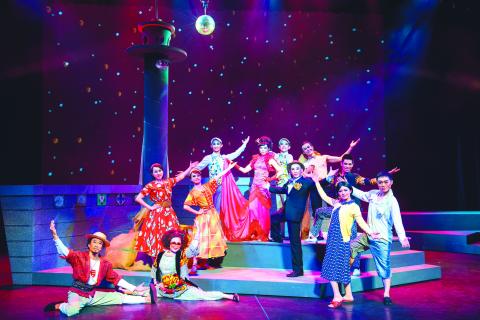Golden Bough Theater (金枝演社) will be celebrating its 20th birthday with a brand new production of its hit musical Happiness (浮浪貢開花), which spawned two sequels after its 2006 debut. The new production, described as a “luxury edition,” brings a top-notch cast and gives star billing to double Golden Melody award winner Tseng Hsin-mei (曾心梅).
When it was founded in 1993 by Wang Rong-yu (王榮裕), Golden Bough dedicated itself to creating a modern yet grassroots style that could revive the popular appeal of local theater.
It is one of the few major theatrical groups that perform predominantly in Hoklo (also known as Taiwanese), rooting its shows in the language and culture of native Taiwanese. With its soap opera sensibility, melodramatic emotions, exaggerated performance style and a stream of hummable tunes, its shows have an exuberant kitschy quality that belies its expressive power. Wang, a veteran of Cloud Gate (雲門舞集) and U-Theater (優人神鼓), has drawn on a mix of ideas drawn from traditional and modern experimental theater to create a style of drama that differs from that which Asia has inherited from the West, and is able to embody the joy of old-style folk theater in a contemporary setting.

Photo courtesy of Golden Bough Theater
Tseng will be performing the role of Miss Meizhi (美智小姐), a songstress who developed her career in the US, but then succumbed to homesickness and returned to her hometown. In a press release, Tseng said that as a child she would often sing as her mother made handicrafts. After she became a well-known singer, she still fondly recalled these times, and could appreciate the feelings of Miss Meizhi, who longs for the simplicity and easy intimacy of rural life in 1960s Taiwan.
The original production was made on a relatively small scale and has been regularly revived since it first premiered at Taipei’s Red House Theater (紅樓劇場).
Kate Shen (沈婷茹), publicity manager for Golden Bough, said that this new production was an upgrade of the original, bringing in bigger names, notably Tseng, and redesigning the stage for greater realism.
Tseng, who is one of the divas of contemporary Taiwanese pop music and who is an experienced TV show host, will be taking to the stage for the first time for Happiness, but given the extensive musical content, she is likely to feel right at home. A number of new songs have been added to the track list, and the tone of the show is like a homage to a golden age, both of the Taiwanese music hall, but also for an idyllic age of simplicity and absurdity, of greater hardship but deeper human intimacy.
In addition to this new production of Happiness, Golden Bough will also be putting on two new shows for its 20th anniversary, one an offshoot of the Happiness series, the other a one-man adaptation of Hamlet by Golden Bough’s lead actor Shi Tung-lin (施冬麟).
Happiness opens in Greater Kaohsiung for two performances today and tomorrow at 7:30pm and 2:30pm respectively, and will be in Taipei City July 26 to July 28 for four shows before rounding off its tour in Tainan on August 17. Tickets for Greater Kaohsiung and Greater Tainan are NT$300 to NT$1,500, for Taipei City they are NT$400 to NT$1,800; available through National Theater Concert Hall ticketing and online at www.artsticket.com.tw.

Towering high above Taiwan’s capital city at 508 meters, Taipei 101 dominates the skyline. The earthquake-proof skyscraper of steel and glass has captured the imagination of professional rock climber Alex Honnold for more than a decade. Tomorrow morning, he will climb it in his signature free solo style — without ropes or protective equipment. And Netflix will broadcast it — live. The event’s announcement has drawn both excitement and trepidation, as well as some concerns over the ethical implications of attempting such a high-risk endeavor on live broadcast. Many have questioned Honnold’s desire to continues his free-solo climbs now that he’s a

As Taiwan’s second most populous city, Taichung looms large in the electoral map. Taiwanese political commentators describe it — along with neighboring Changhua County — as Taiwan’s “swing states” (搖擺州), which is a curious direct borrowing from American election terminology. In the early post-Martial Law era, Taichung was referred to as a “desert of democracy” because while the Democratic Progressive Party (DPP) was winning elections in the north and south, Taichung remained staunchly loyal to the Chinese Nationalist Party (KMT). That changed over time, but in both Changhua and Taichung, the DPP still suffers from a “one-term curse,” with the

Jan. 26 to Feb. 1 Nearly 90 years after it was last recorded, the Basay language was taught in a classroom for the first time in September last year. Over the following three months, students learned its sounds along with the customs and folktales of the Ketagalan people, who once spoke it across northern Taiwan. Although each Ketagalan settlement had its own language, Basay functioned as a common trade language. By the late 19th century, it had largely fallen out of daily use as speakers shifted to Hoklo (commonly known as Taiwanese), surviving only in fragments remembered by the elderly. In

William Liu (劉家君) moved to Kaohsiung from Nantou to live with his boyfriend Reg Hong (洪嘉佑). “In Nantou, people do not support gay rights at all and never even talk about it. Living here made me optimistic and made me realize how much I can express myself,” Liu tells the Taipei Times. Hong and his friend Cony Hsieh (謝昀希) are both active in several LGBT groups and organizations in Kaohsiung. They were among the people behind the city’s 16th Pride event in November last year, which gathered over 35,000 people. Along with others, they clearly see Kaohsiung as the nexus of LGBT rights.